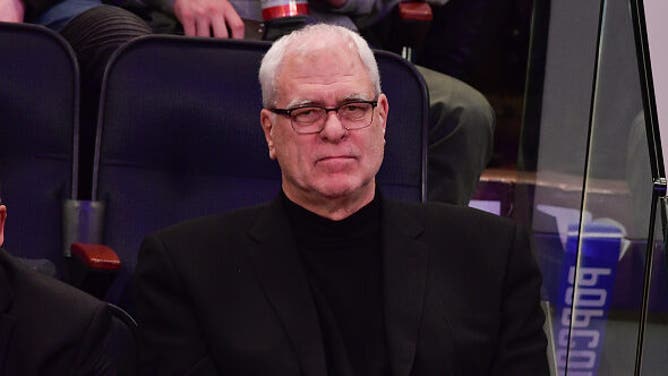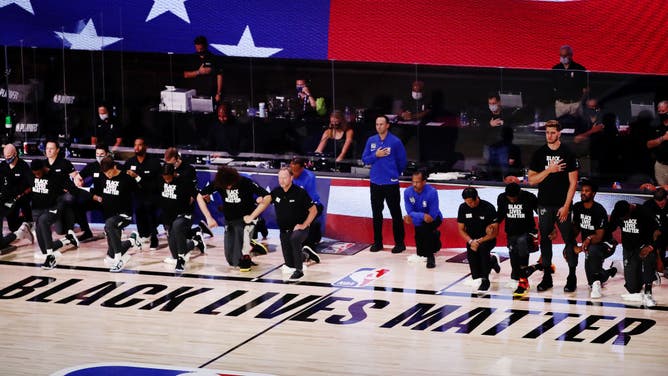Phil Jackson Doesn't Watch NBA Anymore Because It's Too Political
Phil Jackson dedicated most of his life to basketball. But now, the legendary NBA coach says he doesn't have much interest in the sport.
At the pro level, at least.
Appearing as a guest on the "Tetragrammaton with Rick Rubin" podcast, Jackson said he hasn't been a fan since the Orlando Bubble in 2020.
"I am not enjoying the game. That's too bad. There's a whole generation that doesn't like the game," Jackson said. "No, I don't (watch basketball). I watched the game evolve, and then they went into the lockout year and did something that was kind of wanky. They did a bubble down in Orlando."

Phil Jackson — who has won 13 championships as a player and a coach — said he doesn't watch the NBA anynore.(Photo by James Devaney/GC Images)
It was during the Bubble, Jackson said, that the NBA became too political.
"All the teams that could qualify went down there and stayed down there, no audience, and they had things on their back like 'Justice' and a funny thing happened," he said. "Like 'Justice went to the basket and Equal Opportunity knocked him down'... Some of my grandkids thought it was pretty funny to play up those names. I couldn't watch that."
The NBA Adopted the 'Black Lives Matter' Movement
In the summer of 2020, racial tensions were at an all-time high. After the killing of George Floyd, Breonna Taylor and Ahmaud Arbery, NBA players like Russell Westbrook, Damian Lillard, Jayson Tatum and many others used their platform to speak out.
In addition to social justice buzzwords printed on the players' backs, slogans like "Black Lives Matter" were painted on the courts themselves.

(Photo by Mike Ehrmann/Getty Images)
"It was trying to cater to an audience or trying to bring a certain audience to the game, and they didn't know it was turning other people off," Jackson said. "People want to see sports as non-political. Politics stays out of the game. It doesn't need to be there."
One of Jackson's former teams, the Los Angeles Lakers, won the 2020 Bubble championship.
Jackson retired from coaching in 2016 after winning 11 championships — five with the Lakers, and two three-peat runs with the Chicago Bulls. He won two championship as a player in the early 1970s.
Phil Jackson says politics and sports don't mix.
By forcing politics into the game, Jackson says the NBA turns its core fans away.
Commissioner Adam Silver addressed the onslaught of social justice messaging at the conclusion of the 2020 season and said the teams would return to normalcy. While the league remains committed to racial equality, he said, he understands some people just "want to watch a basketball game."
"I would say, in terms of the messages you see on the court and our jerseys, this was an extraordinary moment in time when we began these discussions with the players and what we all lived through this summer," Silver said. "My sense is there’ll be somewhat a return to normalcy, that those messages will largely be left to be delivered off the floor."
And it seemed to work.
Last year, more viewers tuned into the NBA playoffs first round than at any time since 2014.
"It’s amazing how that works. You abandon the woke bullsh-t and fans reward you," OutKick founder Clay Travis tweeted.
A YouGov / Yahoo News poll found that nearly half of the country changed its sports viewing habits once political and social messaging began to spread across the NBA. The data says three times as many Americans watched sports less often than those who watched them more often.
But had the damage already been done?
The 2023 NBA All-Star ratings were awful.
And earlier this month, OutKick reported the NBA is facing a "very difficult economic reality." The league must cut spending and limit hiring in order to stay on track in 2023.
Phil Jackson took some backlash from fans who called him racist for his stance on the NBA's increasingly woke ways. But it's really about hypocrisy.
Because if LeBron James and the NBA really cared about social justice, they'd speak up against the humanitarian crisis in China.
But that sort of activism wouldn't be very profitable.
So it's not that Phil Jackson is wrong. It's that they don't want to admit he might be right.